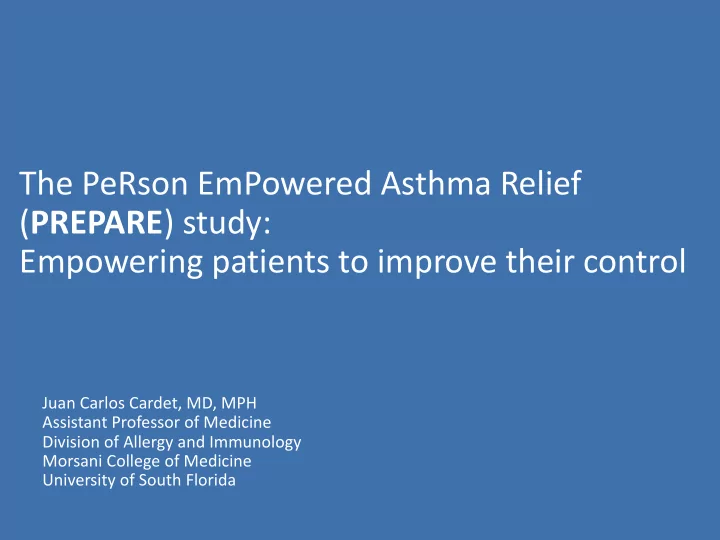

The PeRson EmPowered Asthma Relief ( PREPARE ) study: Empowering patients to improve their control Juan Carlos Cardet, MD, MPH Assistant Professor of Medicine Division of Allergy and Immunology Morsani College of Medicine University of South Florida
COI Disclosures • No conflicts of interest to disclose
Asthma facts • Asthma is the most common chronic disease of the lungs, and affects the airways • 1 out of 12 Americans have asthma • Almost half of patients with asthma have an asthma attack each year (CDC 2015) • African Americans and Hispanics have a higher burden of asthma-related illnesses and deaths (Akinbami 2011)
Current asthma guidelines are not patient-centered • Guidelines recommend daily controller therapy for all but the mildest cases. • Usually with inhaled corticosteroids ( ICS ) • Daily controller ICS therapy decreases asthma attacks and deaths. • However, guidelines don’t adapt to Modified from Expert Panel Report 3, 2007 changes in asthma symptoms. • Patients fill one quarter of daily therapy prescriptions per year. Apter 2011 Modified from the GINA guidelines 2018 • Many interventions have failed to improve adherence.
Patient partner engagement: patients’ preferences for therapy Controller therapy: prevents asthma symptoms ---vs.--- Rescue therapy: quick relief • However, during interviews patient partners say : ⁻ Dislike the controller vs. rescue inhaler distinction ⁻ They don’t want to use their inhalers when they don’t have to ⁻ Concerned about using inhaled corticosteroids ( ICS ) ⁻ They don’t like taking too much medicine
Empowering patients: the PeRson EmPowered Asthma Relief ( PREPARE ) study • P atient- A ctivated R eliever- T riggered I nhaled C ortico S teroid ( PARTICS ) strategy • Symptom-based use of ICS triggered by use of a rescue therapy • Bypasses the issue of adherence • Patients control their treatment
Patient partner engagement: targeting outcomes that matter to patients: asthma attacks ”Asthma attacks are awful – kids miss school, I miss work and I need someone to take care of the kids when I have to go to the ER.” "My employer said to me 'You have a choice to make: either be at work or be at home.’ The realistic fact is I am at home and I am broke, but my children's well-being means the world to me." • Asthma attacks: • Risky, anxiety-provoking to patients and their families • Stressful on health care providers (Lane 2006) • Increase risk of death from asthma (Jorgensen 2003) • Greatest cost to the health care system (Reddel 2009)
Our patient partners Table E-3. Patient Partners African American Patient Partners Hispanic/Latino Patient Partners • Bridget H, age 48, Massachusetts, • Sonia O, age 49, Massachusetts, school volunteer: has asthma, as does her cafeteria worker: asthma since age 10, daughter and her children have asthma • Matt G, age 21, North Carolina, college • Jose F, age 53, Massachusetts: student: has had asthma since age 10 unemployed due to asthma • Suzanne M, 50+, Minnesota, nonprofit • Nicholas P, age 14, Florida, high school director: asthma for 50+ years, always student: asthma since age 1, affects carries rescue inhaler school, sports, sleeping • Kathy W, age 30, Massachusetts, asthma • Margarita L, age 50+, Massachusetts, case coordinator: asthma for 2 years, asthma educator: mother of son with interferes with daily activity and exercise asthma for 15+ years • Opal T, age 38, Massachusetts, video • Richard R, age 19, Arizona, college production: asthma "feels like I am student: asthma since age 6, takes breathing through a straw," affects my inhalers everywhere, can't visit homes work with cats • Mary W, age 50+, Massachusetts, asthma • David T, age 38, Massachusetts, art educator: asthma for 10+ years, has director: asthma since age 8 causing three children with asthma much missed school and work • Why the patient partners are involved: “If t his works it will change people’s lives including my son’s and sister’s” “I can make a difference” “I have been able to share my experience and knowledge” “It’s rewarding to see how the patient partners are being heard”
Patient partner involvement • Patient Partners – patients with asthma or caregivers • 7 African American, 7 Hispanic/Latino (2 Spanish-speaking only) • 2 patient partner project managers • 1 patient advisory specialist consultant Intervention selection • Questionnaire wording • • Patient partners are engaged in all Study material vetting • aspects of the study Wording of survey reminders • Choosing the outcome • • Patient partners have a monthly call (English and Spanish)
Patient partner impact • Patients Engaged since protocol development Explained what outcome was important to them (asthma attacks) – • Suggested doing a pilot study– to test study processes – Major changes to the full study after the pilot • Shortened monthly questionnaire • Relaxed survey login procedures • Developed participant education tools and study materials: Order of video messages – Best pouches to use – Recruitment flyer wording – Patient take home packet –
Patient partner impact (continued) • Blood draw Patient partners developed wording for the study coordinators – to use to explain why we want blood drawn • Emphasized simplicity of consent language • Monthly survey compliance Survey reminder messages – adding a lottery to enhance response rate – • Retention Semi annual “Thank You” card –
Next steps for disseminating results
Summary • Asthma is a serious and burdensome disease, particularly in highly-impacted minority populations. • Guidelines are difficult to enforce, and daily controller therapy with inhaled corticosteroids is underused; we hypothesize PARTICS will work by empowering patients to use therapy how they prefer and want to use it. • Patients’ input is invaluable in study design, and ensures we address relevant issues with realistic solutions.
Questions? … Thanks!
Recommend
More recommend